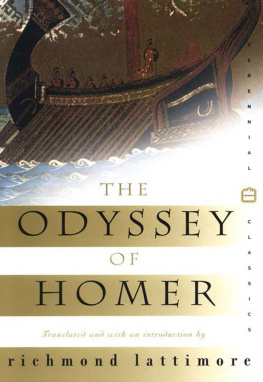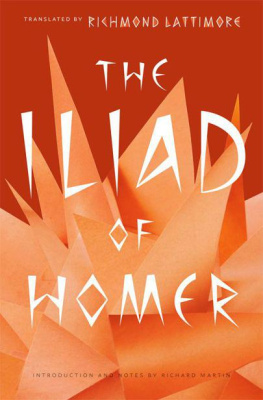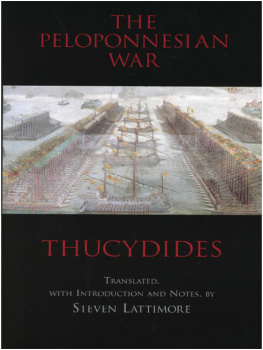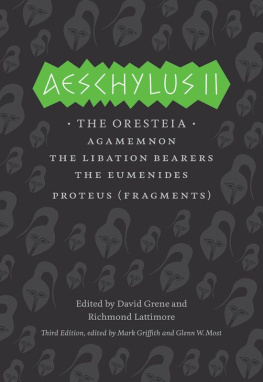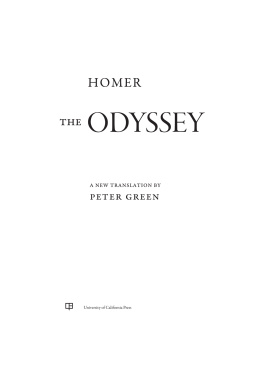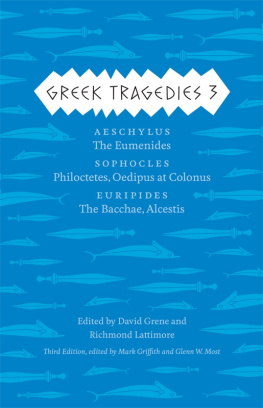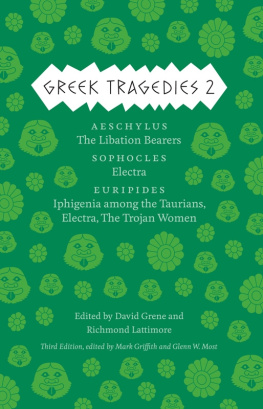Richmond Lattimore (trans.) - The Odyssey of Homer
Here you can read online Richmond Lattimore (trans.) - The Odyssey of Homer full text of the book (entire story) in english for free. Download pdf and epub, get meaning, cover and reviews about this ebook. publisher: Harper-Collins, genre: Art / Prose. Description of the work, (preface) as well as reviews are available. Best literature library LitArk.com created for fans of good reading and offers a wide selection of genres:
Romance novel
Science fiction
Adventure
Detective
Science
History
Home and family
Prose
Art
Politics
Computer
Non-fiction
Religion
Business
Children
Humor
Choose a favorite category and find really read worthwhile books. Enjoy immersion in the world of imagination, feel the emotions of the characters or learn something new for yourself, make an fascinating discovery.
- Book:The Odyssey of Homer
- Author:
- Publisher:Harper-Collins
- Genre:
- Rating:4 / 5
- Favourites:Add to favourites
- Your mark:
- 80
- 1
- 2
- 3
- 4
- 5
The Odyssey of Homer: summary, description and annotation
We offer to read an annotation, description, summary or preface (depends on what the author of the book "The Odyssey of Homer" wrote himself). If you haven't found the necessary information about the book — write in the comments, we will try to find it.
The Odyssey of Homer — read online for free the complete book (whole text) full work
Below is the text of the book, divided by pages. System saving the place of the last page read, allows you to conveniently read the book "The Odyssey of Homer" online for free, without having to search again every time where you left off. Put a bookmark, and you can go to the page where you finished reading at any time.
Font size:
Interval:
Bookmark:
The Odyssey of Homer Translated with an introduction by Richmond Lattimore 
 To Royal Nemiah
To Royal Nemiah
I begin by summarizing the bare facts of the story. Odysseus spent ten years fighting at Troy, and another ten years getting home. During this time, none of his family knew what had happened to him, and he lost all his ships, all his men, and the spoils from Troy. After ten years, or in the tenth year, he was set down in his own country, alone and secretly, though with a new set of possessions, by the Phaiakians of Scheria, who were the last people he visited on his wanderings. When he took ship for Troy, Odysseus left behind his wife, Penelope, and his infant son, Telemachos. A few years before his return, the young bachelors of Odysseus kingdom, Ithaka and the surrounding islands, began paying court to Penelope (ii.89-90).
She was accomplished and clever, still beautiful, an heiress and presumably a widow; but she clung to the hope that Odysseus might come back, and held them off, without ever saying positively that she would never marry again. The suitors made themselves at home as uninvited guests in the palace of Odysseus. Shortly before the return of Odysseus, Telemachos visited the mainland in search of news about his father. He heard from Menelaos that Odysseus was alive but detained without means of return on the island of Kalypso (iv.555-560). Telemachos returned to Ithaka. The suitors set an ambush, meaning to murder him, but he eluded them and reached Ithaka just after his father arrived.
The voyage of Telemachos, the arrival of Odysseus, and the recognition and reunion of father and son, were all supervised by Athene. Father and son plotted the destruction of the suitors. Odysseus entered his own house unrecognized, mingled with the suitors and talked with Penelope. He and Telemachos contrived to catch them unarmed and with the help of two loyal serving men (and of course Athene) they slaughtered all 108 suitors. Penelope knew nothing of the plot; Odysseus revealed himself to her after the fighting was over. The relatives of the dead suitors attacked the heroes on the farm of Laertes, father of Odysseus, and a battle began, but it was ended by Zeus and Athene, who patched up a hasty reconciliation.
THE TELEMACHY The Odyssey , like the Iliad , begins in the tenth year of the story's chief action, with events nearing their climax and final solution. We begin with a very rapid location of Odysseus in place, time, and stage in his career, but then (via the councils of the gods concerning his immediate fate) pass to Telemachos, with Athene's visit which sends him off on his journey. It is only after Telemachos has begun his visit in Sparta, and heard from Menelaos that his father is alive, and after the suitors have set their trap, that we return directly to Odysseus himself. We then follow Odysseus for the rest of the Odyssey . The poet now tells us of Odysseus' journey to Scheria and his sojourn there; and he makes Odysseus himself recount to the Phaiakians his previous wanderings (The Great Wanderings). They then convey him to Ithaka, and with his homecoming the tale of the wanderings of Odysseus joins on to the tale of Odysseus on Ithaka.
Thus in two respects the narrative order of the poem disagrees with the chronological order of the story. The early and chief wanderings of Odysseus are told by throwback narrative toward the middle of the poem; and the wanderings of Telemachos come first. The joins or transitions from theme to theme are noteworthy. After the poet has located Odysseus in time and space, the gods consider the question. Athene urges the homecoming of Odysseus. Zeus proclaims that Athene shall have her way; Odysseus may now start for home.
Athene answers (i.81-95) Son of Kronos, our father, O lordliest of the mighty , if in truth this is pleasing to the blessed immortals , that Odysseus of the many designs shall return home, then let us dispatch Hermes, the guide, the slayer of Argos , to the island of Ogygia, so that with all speed he may announce to the lovely-haired nymph our absolute purpose , the homecoming of enduring Odysseus, that he shall come back . But I shall make my way to Ithaka, so that I may stir up his son a little, and put some confidence in him to summon into assembly the flowing-haired Achaians , and make a statement to all the suitors, who now forever slaughter his crowding sheep and lumbering horn-curved cattle ; and I will convey him into Sparta and to sandy Pylos to ask after his dear father's homecoming, if he can hear something , and so that among people he may win a good reputation . This excellently motivates the Telemachy but it does perforce leave Odysseus stranded, and after the major part of the Telemachy, at the opening of Book v, the return to Odysseus shows more strain than the departure from him did. Athene has been to Ithaka, and to Pylos with Telemachos. She left the court of Nestor, presumably for Olympos (iii.371). Now she has to start all over again, almost as if the case of Odysseus had never come up, to complain of his sorrows; but ends with the perils of Telemachos; and Zeus seems to have to remind her that she herself planned everything that has just been happening (v.23).
Hermes, who has been waiting for this for four books and five days, can at last get off (i.84; v.28) and the wanderings of Odysseus may be resumed. The obviousness of the joins and the bulk of material not specifically related to Odysseus in Books iii-iv, his absence from Books i-ii, have suggested that the Telemachy was an independent poem which was, at some stage, incorporated more or less whole in the Odyssey . of the Odyssey , in the form in which we have it, deliberately developed this diversion, never meaning to take up Odysseus until he had first established Telemachos; that he so much desired to do this that he was willing to accept the necessary awkwardnesses of narrative joining in which it would involve him. Why so? Let us consider the effects gained for the total poem from having the Telemachy with its present contents in its present place. Odysseus in the Iliad was a great man, but his magnitude is increased by the flattering mentions of him by Nestor (iii.120-123), Menelaos (iv.333-346), and Athene herself (i.255-256 with 265-266). It is increased still more by the evident need for him felt by his family and friends, concisely stated by Athene (i.253-254): How great your need is now of the absent Odysseus, and everywhere apparent.
Through Nestor and Menelaos, also, the Odyssey is secured in its place among the Nostoi , the homecomings of the Achaians. The general character of the Nostoi is succinctly stated by Nestor (iii.130-135) But after we had sacked the sheer citadel of Priam , and were going away in our ships, and the god scattered the Achaians , then Zeus in his mind devised a sorry homecoming for the Argives, since not all were considerate and righteous ; therefore many of them found a bad way home, because of the ruinous anger of the Gray-eyed One, whose father is mighty . The sufferings of two great heroes, by long wandering away from home (Menelaos) and by treachery and disaster on arrival (Agamemnon), both well point up the case of Odysseus in two of its different aspects. For an audience well versed in the tale of Troy, or the Iliad , interest is added in a second viewing of some old favorites: Nestor, Helen, Menelaos, all very like themselves in the Iliad . Without planning some such excursus as the Telemachy, the poet could not have worked them in without a great deal more awkwardness than it has, in fact, cost him. Another point gained through the Telemachy is the instigation to murder.
Font size:
Interval:
Bookmark:
Similar books «The Odyssey of Homer»
Look at similar books to The Odyssey of Homer. We have selected literature similar in name and meaning in the hope of providing readers with more options to find new, interesting, not yet read works.
Discussion, reviews of the book The Odyssey of Homer and just readers' own opinions. Leave your comments, write what you think about the work, its meaning or the main characters. Specify what exactly you liked and what you didn't like, and why you think so.

